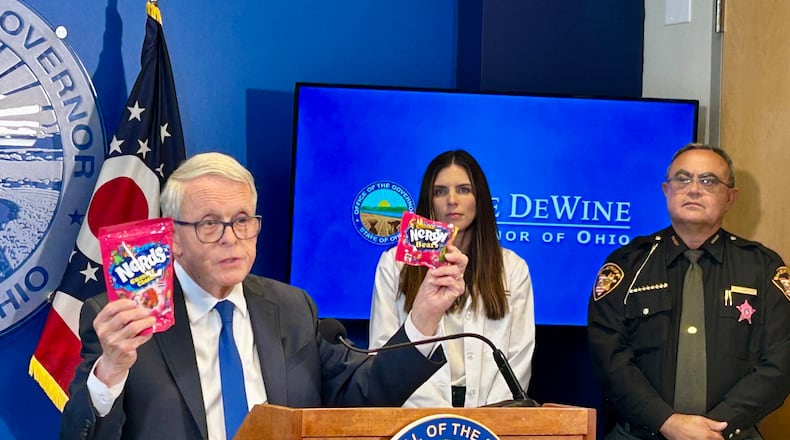The first executive order gives the Ohio Department of Agriculture the swift authority to redefine the state’s legal definition of hemp products to exclude intoxicating hemp. He expects the change to go into effect Oct. 14.
That rule will be valid for 120 days while the regular rulemaking process proceeds.
The other order creates an “adulterated consumer emergency,” also starting Oct. 14, which asserts that intoxicating hemp products are effectively tampered with and are now dangerous, and requires all retailers in the state to get qualifying products off their shelves.
After that, local and state authorities will have the ability to seize intoxicating hemp products still available for sale. Retailers could be fined $500 per day if the products stay on sale.
The ordered emergency can remain in effect for a maximum of 90 days unless it is renewed by the Ohio General Assembly.
This approach goes well beyond other legislative ideas, like limiting sales to Ohioans 21 or older, or restricting intoxicating hemp sales to recreational marijuana dispensaries, or requiring that Ohio-sold intoxicating hemp is safety tested before distribution.
At his press conference, DeWine had on display three intoxicating hemp products found in convenience stores that mimic the packaging or branding of Sour Patch Kids, Nerds Gummy Clusters and Gushers.
“They do it on purpose,” DeWine said. “They do it to attract kids.”
Lawmakers respond
House Minority Leader Dani Isaacsohn, D-Cincinnati, told reporters on Wednesday that DeWine was right to take action, questioned whether executive orders could be a long-term solution, and criticized the legislature for failing to pass guardrails itself. “We know how to do this,” he said.
“At a baseline, it shouldn’t be marketed towards children; you should have to be a certain age to buy them; we should know what the ingredients are; they should have to be behind the counter,” Isaacsohn said. “There are all sorts of ways we regulate beer and wine, we do it a little differently than we do hard liquor, so we certainly should be able to come up with a mechanism for how we regulate intoxicating hemp.”
Questions over whether DeWine has the executive authority to regulate intoxicating hemp sales stem back to his own admission, in a January 2024 press conference, that he’d need the legislature to take action in order to get any significant safeguards into law.
Despite ensuing talks and proposals within both the House and the Senate — with the latter even passing a bill that would have limited intoxicating hemp product sales to dispensaries — talks have broken down between chambers.
Now, DeWine said he asked his lawyers to take another look.
“We believe we have this authority to do this, and I’m not going to sit back and not do it,” the Republican governor said. “I went back to my lawyers and I said this problem continues to get worse. It is absolutely absurd that a 14-year-old or 13-year-old can walk into the store and buy this stuff. It’s never what anybody intended when the hemp law was passed.”
Rep. Tex Fischer, R-Boardman, told reporters Wednesday that, while he shares DeWine’s frustration with the legislature’s inaction, the executive order approach is too broad.
“While he’s well-intended and he certainly has some good points in the products he brought out, simply put, this is an issue that needs addressed with a scalpel and he’s taken a machete approach,” Fischer said, arguing that the orders will put millions of dollars of products, jobs and small businesses at risk throughout Ohio.
“I don’t find that to be an acceptable solution here,” Fischer said.
House Speaker Matt Huffman, R-Lima, whose caucus has so far shunned the Senate’s proposal to move intoxicating hemp products to recreational dispensaries, told reporters Wednesday that he expects the governor’s executive order to spur further action.
“I think that this stirs up the water; this gets everybody wanting to move. Hopefully, folks on either side are not so ensconced in their positions that they don’t want to talk about it,” Huffman said. “From the standpoint of stimulating a conversation and action, I think it would be helpful.”
Area Sen. Steve Huffman, R-Tipp City, who is both the cousin of the House speaker and the architect of the Senate’s intoxicating hemp plan, released a statement Wednesday supporting the governor’s action.
“The Senate passed a bipartisan unanimous plan that would put these products where they belong — in the marijuana dispensaries," the statement reads. “The Governor’s point is well taken. These highly intoxicating products should be kept out of convenience stores where they pose a significant danger to teenagers and children who may not realize the potent THC intoxication risk, and also based on the packaging, think these products are something they are not.”
For more stories like this, sign up for our Ohio Politics newsletter. It’s free, curated, and delivered straight to your inbox every Thursday evening.
Avery Kreemer can be reached at 614-981-1422, on X, via email, or you can drop him a comment/tip with the survey below.


